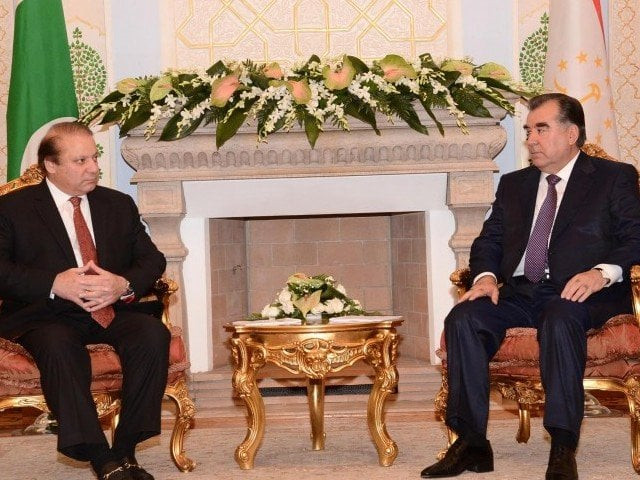PM vows swift signing of trilateral transit trade accord
Work on transmission lines for power export to Pakistan to begin in September

Work on transmission lines for power export to Pakistan to begin in September. PHOTO: PID
The promise was made when Sharif, accompanied by a high-level delegation, visited Dushanbe on June 9-10 on the invitation of Tajikistan president for participation in an international conference on Implementation of the International Decade for Action “Water for Life” 2005-2015.

“This deal will not only connect the three countries, but will also make Pakistan a transit state that will earn more revenue,” said Jononov while talking to The Express Tribune. “It will also help boost activities at Pakistani ports, especially the Gwadar Port, making it a hub of trade activities in the region.”
Tajikistan appears to be a strategic partner of Pakistan, particularly in the energy sector, which will connect Pakistan with Central Asia. The two sides have signed a final deal on the Central Asia South Asia (Casa) 1,000-megawatt power supply project.
“Tajikistan is committed to exporting electricity to Pakistan to help ease its energy crisis and work on laying transmission lines will start in September this year,” Jononov said.
The hydroelectric power trade agreement was signed by Kyrgyz Republic, Tajikistan, Afghanistan and Pakistan in December last year in Turkey. Under the project, 1,000MW of clean energy will be exported to Pakistan at a price of 9.35 cents including all charges.
Although conceived long ago, the current PML-N government took the initiative to step up work on the project. “Work on a tender to award contract for laying the power transmission lines is continuing,” he said.
The Casa-1,000 project is slated for completion by 2018 under the umbrella of the World Bank. Tajikistan will have a share of 70% in energy export while Kyrgyzstan will make 30% contribution.
Afghanistan will consume 300MW of exported electricity while Pakistan will receive 1,000MW. The project is expected to give a boost to energy trade in the region that will lead to sustainable development.
In addition to the Casa-1,000 project, according to officials of the Ministry of Water and Power, Pakistan and Tajikistan were set to explore new avenues for the supply of 1,000MW by laying transmission lines from Chitral to northern areas in an attempt to put surplus energy to use and help ease energy shortages.
“We have the capacity to export an additional 1,000MW through the Chitral route that will help Pakistan overcome the energy crisis,” Jononov said.
“Pakistan and Tajikistan are cooperating on three fronts – energy, transport and trade – in order to bring the two countries closer. This plan will integrate two regions of Asia and boost economic development,” he said. “Pakistan is currently facing the threat of terrorism and socio-economic development is the only way to fight terrorism.”
Published in The Express Tribune, June 19th, 2015.
Like Business on Facebook, follow @TribuneBiz on Twitter to stay informed and join in the conversation.



















COMMENTS
Comments are moderated and generally will be posted if they are on-topic and not abusive.
For more information, please see our Comments FAQ